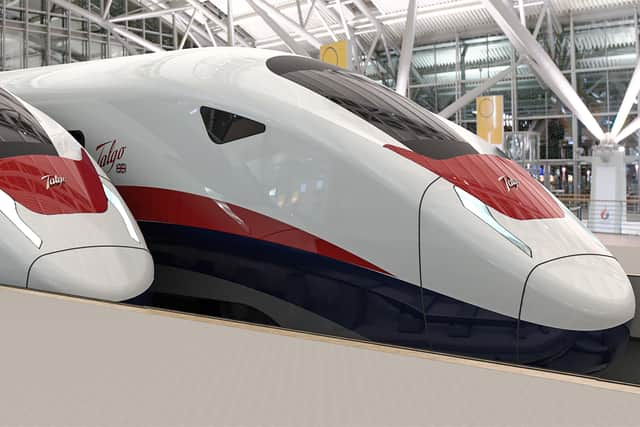Will giant train factory rise from ashes of Longannet? – Alastair Dalton


It is the site of an industrial dinosaur on which hopes are being pinned of creating a green transport future – and up to 1,000 new jobs.
The former coal-burning Longannet Power Station is being demolished to make way for what is hoped will be a train-building factory that could even manufacture those for HS2.
Advertisement
Hide AdAdvertisement
Hide AdTalgo, the Spanish firm behind the plans, is certainly building up expectations. One of its train carriages was brought to nearby Kincardine last week, where school pupils were told of potential future opportunities.


The plans were further talked up at a reception at the Scottish Parliament, including by Transport Secretary Michael Matheson and fellow Cabinet member and local MSP Shirley-Anne Somerville.
The scheme also brings the prospect of the reopening to passengers of the rail line from Alloa, which was restored for coal trains in 2008, and even as far as Dunfermline, which could create a direct link between Fife, Stirling and Glasgow.
Talgo said its two other factories were at full capacity so it needed another. But, crucially, opening at Longannet depends on the company winning a major contract.
225mph trains
It announced the site near the end of 2018 and gained planning permission last December with the help of Scottish Enterprise. Now it’s a waiting game to see if and when that order materialises. But company chiefs seem pretty optimistic because not all their eggs are in one basket.
Their obvious target is HS2, especially now Boris Johnson has signalled it will, after all, go ahead, albeit with trains running somewhat later than originally planned – and more than a decade away.
Talgo is on the shortlist against four other bidders for the £2.75 billion order to build 54 trains that would run at up to 225mph.
Awarding the contract to Talgo would be a convenient way for the Prime Minister to include Scotland in the project when the country will gain, at least initially, marginal benefits from it otherwise. Journey times will only shrink slightly and four-hour Edinburgh-London trips are due to be the norm from the end of next year anyway. SNP Westminster leader Ian Blackford has already called for Talgo to be awarded the contract.
Competitors hungry for work
Advertisement
Hide AdAdvertisement
Hide AdBut Talgo has other irons in the fire for Longannet. It is also chasing orders in areas such as South America and Africa, but executives are guarded about when they will know if they have been successful.
The company’s trump card appears to be its pledge that Longannet would be a “true manufacturing” plant, where trains would be built from scratch rather than just assembled from imported parts, as happens at its competitors in the UK. Talgo UK managing director Jon Veitch has gone so far as to say it would be “the only British manufacturer”.
Experts tell me that’s what could swing it for the HS2 order, other things being equal, since it would maximise job creation. Talgo is also said to have secured its post-Brexit supply chain for materials.
Talgo president Carlos Palacio Oriol, the grandson of the 78-year-old company’s founder, who also took part in last week’s events, has added that its competitors don’t have enough work for their own factories – although that’s likely to make them even hungrier for the contracts up for grabs. Talgo still has a fight on its hands to realise its Fife dream.
